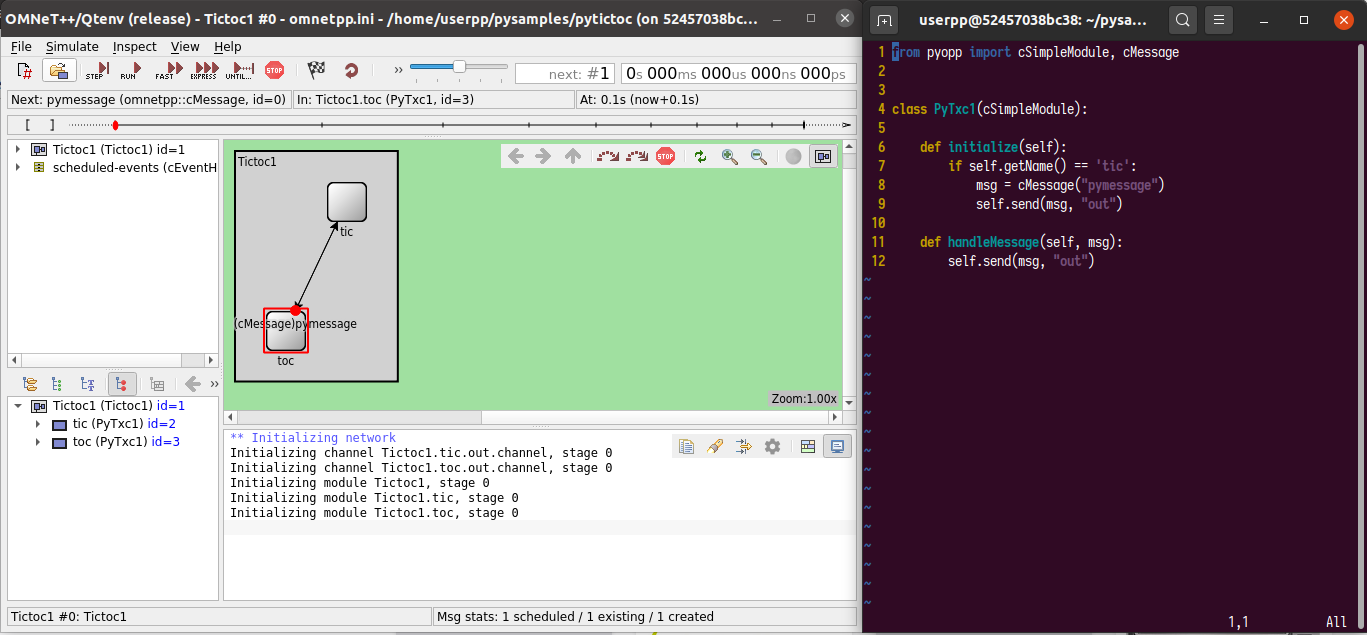OMNeT++ meets python
TL;DR: implement OMNeT++ simulations using python programming language:
- no need to know C++
- all the power of python is suddenly available
- faster prototypes
- even using the OMNeT++ IDE (if you wish...)
Ok, I'm in... tell me more...:
Leveraging some design decisions made in the original project, it is possible to have OMNeT++
launch a python interpreter, instanciate classes you wrote in python, and use them as regular
cSimpleModule subclasses.
The original code for OMNeT++ needs no change. This repository provides python bindings for C++
APIs (to allow the user subclass cSimpleModule from python) and some C++ headers to have
OMNeT++ accept this code.
The project is the result of an academic research, see current state and limitations below.
Launch a contianer:
you@yourmachine$ docker run --rm \
-ti -e DISPLAY=$DISPLAY \
-v /tmp/.X11-unix:/tmp/.X11-unix \
mmodenesi/omnetpy bash
On the container, launch the omnetpp IDE:
userpp@container$ omnetpp
- You want to build simulations using OMNeT++ but your C++ knowledge is weak.
- You want to use OMNeT++ for educational purposes, and your students are more proficient in python than C++.
- You want to prototype a model faster; you can rewrite the code in C++ later.
- You are interested in making changes to the code and being able to use it without any extra compilation steps.
- Excepting
dyna, all OMNeT++ demostrative samples were successfuly ported to python (see pysamples), which means it is fairly usable. - The original goal of the project was to enable python implementation of OMNeT++ simluations, which was largely achieved. For the moment, no further improvements are being implemented (automatic bindings generation, QA, docker images for each release of OMNeT++, etc).
- Dynamic deletion of modules is not supported (the
dynasample could not be ported). - python code debugging is not supported.
- Automatic code generation for messages is not supported (yet, being python so flexible, it's not missed, either).
- The python bindings were written by hand (an activity that could be automated) and may have subtle bugs.
- The python bindings were written as needed in order to port the OMNeT++ samples. Not 100% of the C++ APIs were ported (though it may be easy to include what is missing).
- This is an academic project. Many things were written "just to make it work" and may not scale well.
- This project was not heavily used.
- The optimization of the docker image (size, layering, etc.) was never a top priority.
- Launching graphical applications (OMNeT++ IDE, simluations) from docker was only tested on ubuntu.
As a derivative work of OMNeT++, this code is distributed under Academic Public Licence version 1.1.
